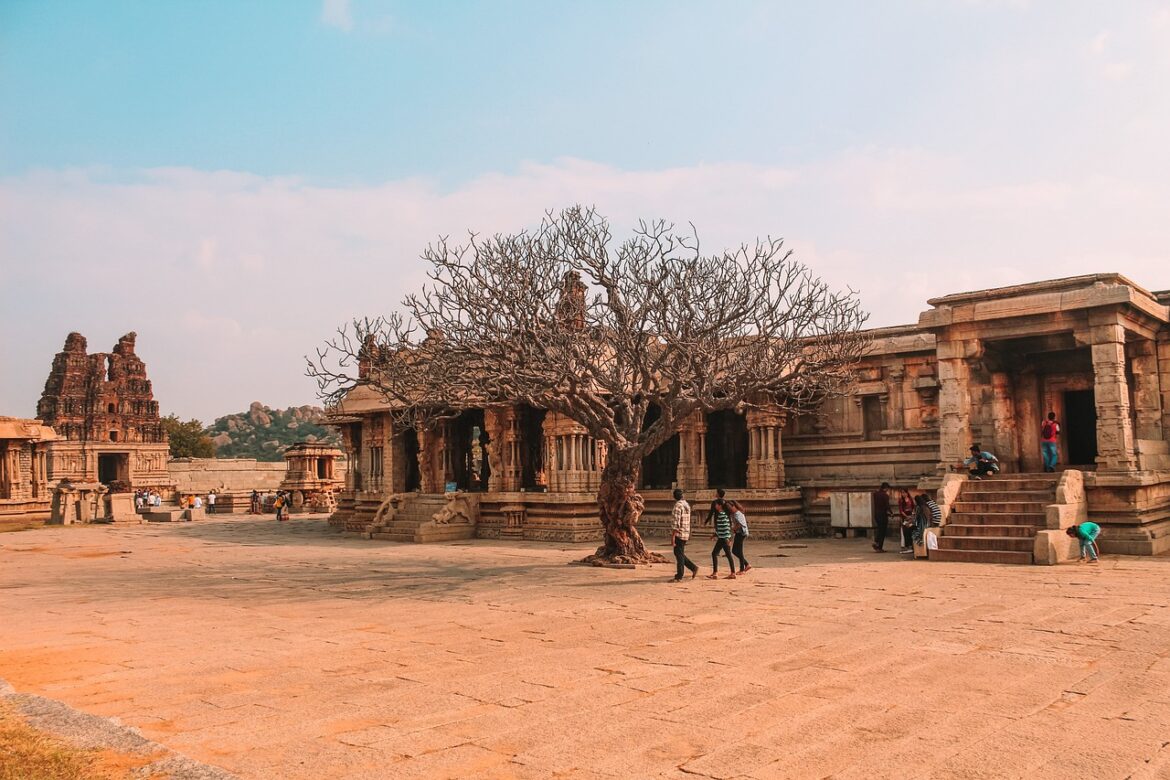In the heart of Karnataka, the ancient city of Hampi emerges as a living canvas of history, culture, and gastronomy. Hampi’s significance lies in its splendid ruins, remnants of the Vijayanagara Empire that once thrived here. As you wander through the mesmerizing landscapes dotted with intricate stone carvings and majestic temples, the city’s storied past comes to life, setting the stage for a culinary journey deeply intertwined with its historical roots.
Historical Tapestry of Hampi: The ruins of Vijayanagara, a UNESCO World Heritage Site, stand as silent witnesses to a bygone era of grandeur and architectural brilliance. Each stone narrates tales of a flourishing empire, vibrant markets, and a sophisticated urban lifestyle. Exploring the ancient streets, bazaars, and temples reveals the architectural marvels that once defined this city. The Virupaksha Temple, Achyutaraya Temple, and the iconic stone chariot at the Vittala Temple showcase the engineering prowess and artistic finesse of the Vijayanagara craftsmen.
Banana Leaf Feasts: Amidst this historical tapestry, Hampi’s culinary scene unfolds with distinctive charm. One of the quintessential experiences is the traditional South Indian feast served on banana leaves. The artistry of laying out an array of dishes on the expansive green leaf is not just a culinary ritual but a cultural practice that reflects the warmth and hospitality ingrained in the local ethos. From aromatic rice and flavorful curries to crispy dosas and assorted chutneys, each dish invites you to savor the authentic flavors of South Indian cuisine.

Savoring South Indian Delicacies: The culinary journey through Hampi extends beyond the banana leaf feasts. The local eateries, tucked away in narrow lanes, serve a delightful array of South Indian delicacies. Steaming hot idlis, fluffy vadas, and the iconic masala dosas dominate breakfast tables, accompanied by aromatic filter coffee that lingers on the taste buds. As the day progresses, lunch becomes a palette of flavors, featuring tangy sambar, coconut-based curries, and assorted rice dishes that pay homage to the region’s agricultural abundance.
Culinary Heritage of Karnataka: Hampi’s gastronomy is deeply rooted in the culinary heritage of Karnataka, embracing a rich tapestry of flavors that reflect the diversity of the state. Local specialties, such as Bisi Bele Bath (hot lentil rice) and Jolada Roti (sorghum flatbread), showcase the unique culinary identity shaped by centuries of cultural influences. The liberal use of coconut, jaggery, and a symphony of spices adds depth and authenticity to each dish, inviting visitors to embark on a gastronomic adventure through Karnataka’s distinctive flavors.
The Aroma of South Indian Curries: In Hampi, the aroma of South Indian curries wafts through the air, drawing visitors to quaint eateries and street food stalls. The meticulous blend of spices, including mustard seeds, curry leaves, and asafoetida, creates a symphony of flavors that defines the region’s curries. Whether indulging in the spiciness of a traditional Mysore masala dosa or relishing the comfort of a coconut-based vegetable stew, every bite speaks to the culinary artistry inspired by the diverse landscapes of Karnataka.
Riverside Bliss by the Tungabhadra: Beyond the bustling streets and historical marvels, Hampi offers a unique gastronomic experience along the banks of the Tungabhadra River. Riverside cafes and eateries provide a tranquil setting where visitors can savor delicious meals while enjoying panoramic views of the river. The gentle breeze carries with it the essence of Hampi, creating an ambiance where culinary delights merge seamlessly with the blissful surroundings.
Sundown Delights: As the sun sets over the Tungabhadra, Hampi’s culinary scene transforms into an enchanting display of sundown delights. Riverside cafes come alive with the soft glow of lanterns, creating a magical atmosphere for evening meals. Whether it’s indulging in a hearty thali, relishing freshly caught fish, or sampling local sweets, the riverside setting adds an extra layer of charm to the gastronomic experience, making every meal a memorable affair.
Cultural Fusion on Every Plate: Hampi’s gastronomy is a testament to the cultural fusion that has shaped the region over centuries. Influences from the Deccan Plateau, the Vijayanagara Empire, and the neighboring states converge on every plate, creating a culinary mosaic that reflects the diversity of India’s southern regions. Each dish, from the fiery Gunpowder Chutney to the sweet holige, tells a story of cultural exchange and the harmonious blending of flavors.
Community Dining and Festivals: The communal spirit of dining is a cherished tradition in Hampi, especially during festivals and celebrations. Local communities come together to prepare and share meals, emphasizing the social bonds forged over food. During festivals like Hampi Utsav, the city’s culinary scene reaches its zenith, with food stalls lining the streets, offering a carnival of flavors that encapsulate the festive spirit and communal harmony.
Preserving Culinary Traditions: Hampi’s commitment to preserving its culinary traditions is evident in the efforts of local chefs and establishments. Cooking classes and food tours provide visitors with an opportunity to not only savor the flavors but also to understand the techniques and stories behind each dish. The community’s dedication to passing down recipes from generation to generation ensures that the gastronomic heritage of Hampi remains a vibrant and integral part of the city’s identity.
A Gastronomic Odyssey Through Time: In essence, exploring Hampi’s gastronomy is akin to embarking on a gastronomic odyssey through time. Each bite is a taste of history, each meal a celebration of cultural continuity, and each setting a testament to the resilient spirit of a city that has gracefully embraced its past while inviting the world to savor the richness of its present. Hampi, with its ruins, banana leaf feasts, and Tungabhadra Riverside bliss, is not just a destination but a sensory journey that transcends time, inviting every visitor to partake in the gastronomic legacy of Karnataka.
Local Markets and Culinary Exploration: The vibrant local markets of Hampi add another layer to its culinary narrative. These bustling hubs showcase the region’s agricultural abundance, with vendors selling fresh produce, aromatic spices, and traditional ingredients. Exploring these markets becomes a sensory experience, offering a glimpse into the raw, unprocessed elements that form the backbone of Hampi’s flavorful cuisine. Visitors can witness the intricate dance of colors and aromas, awakening their senses to the authenticity that defines each dish.
Temple Prasadam and Spiritual Nourishment: In the heart of Hampi’s cultural landscape, the temples not only stand as architectural marvels but also serve as culinary sanctuaries. Temple prasadam, the sacred offerings distributed to devotees, provides a unique opportunity to partake in spiritual nourishment. These simple yet delectable offerings, often consisting of Kesari (sweet semolina), Puliyogare (tamarind rice), and Pongal (rice and lentil dish), connect the act of eating with a spiritual journey, transcending the boundaries between culinary and divine experiences.
Seasonal Delicacies and Festive Fare: Hampi’s culinary calendar is influenced by the changing seasons and the rhythm of festivals. The arrival of the monsoon brings with it a plethora of seasonal delicacies, with dishes like obbattu (sweet flatbread) and saaru (spicy lentil soup) taking center stage. Festivals like Ugadi and Diwali herald a burst of festive fare, with families coming together to prepare traditional sweets like holige and obbattu. The culinary landscape adapts to the ebb and flow of nature, ensuring that each season and celebration is marked by a distinct and delightful array of flavors.
Legacy of Street Food: Hampi’s streets are alive with the legacy of street food, offering a myriad of flavors to those exploring its nooks and crannies. Street-side stalls serve up quick bites and snacks that capture the essence of local tastes. From pani puri bursting with tangy flavors to bhajjis dipped in spicy chutneys, the street food scene in Hampi provides a delicious snapshot of everyday life, where culinary delights are enjoyed on the go amidst the city’s historical splendor.
Rural Homestays and Farm-to-Table Experiences: Venturing beyond the city center, rural homestays offer a farm-to-table experience that provides insight into the agricultural traditions of Hampi. Guests can participate in harvesting fresh vegetables, plucking fruits from orchards, and even engage in traditional cooking sessions guided by local hosts. These immersive experiences not only connect visitors with the origins of their meals but also foster a deeper appreciation for the sustainable and organic practices embedded in Hampi’s culinary ethos.
The Intersection of Modern and Traditional: While Hampi proudly preserves its culinary heritage, the city also embraces the intersection of modern and traditional flavors. Upscale restaurants and cafes introduce innovative twists to classic recipes, catering to a diverse range of palates. Visitors can enjoy a fusion of traditional South Indian dishes with global influences, creating a gastronomic landscape that mirrors the city’s openness to culinary evolution while respecting its historical roots.
Culinary Tourism and Cultural Exchange: Hampi’s culinary scene has become a magnet for culinary tourists seeking an authentic taste of Karnataka. Culinary tours and workshops facilitate a deeper understanding of the city’s gastronomic traditions, allowing visitors to engage with local chefs, learn age-old recipes, and participate in the preparation of regional specialties. This exchange fosters a cultural dialogue, where the act of sharing a meal becomes a bridge between diverse communities, fostering mutual understanding and appreciation.
Hampi’s Culinary Arts Festivals: To celebrate its rich culinary heritage, Hampi hosts annual culinary arts festivals that attract chefs, food enthusiasts, and travelers from around the world. These festivals showcase the diversity of Karnataka’s culinary traditions through live cooking demonstrations, food tastings, and cultural performances. The events serve as a vibrant platform for the city’s culinary artists to share their expertise, ensuring that the gastronomic legacy of Hampi continues to flourish.
Community Culinary Initiatives: Hampi’s culinary landscape is not only about restaurants and street food; it’s a communal affair that extends to various culinary initiatives. Community-driven projects focus on preserving traditional recipes, reviving ancient cooking techniques, and promoting sustainable practices. These initiatives create a collaborative environment where locals, chefs, and travelers come together to celebrate the shared heritage and future sustainability of Hampi’s culinary legacy.
A Taste of Tomorrow: In Hampi, the culinary journey is not just a nostalgic exploration of the past; it’s a dynamic narrative that continually evolves, embracing the tastes of tomorrow. As Hampi looks to the future, its culinary scene stands as a testament to the city’s resilience, adaptability, and commitment to preserving its cultural identity. Through each dish, festival, and community initiative, Hampi invites the world to savor the flavors of a city where history, tradition, and innovation converge on every plate.
Savoring the Soul of Hampi: As our immersive exploration of Hampi’s culinary tapestry draws to a close, we find ourselves not merely recounting flavors but savoring the very soul of this ancient city. Hampi’s culinary journey is a testament to the intertwining narratives of history, tradition, and innovation, each dish a chapter in the rich story of Karnataka’s cultural heritage.
From the grandeur of Vijayanagara’s ruins to the tranquility along the Tungabhadra River, Hampi’s gastronomy mirrors the resilience and continuity that define the city’s character. The traditional banana leaf feasts, the intricate aromas of South Indian curries, and the communal spirit of festive celebrations all contribute to an experience that transcends the act of eating, transforming it into a sensory journey through time.
The legacy of Hampi’s street food, the seasonal delicacies that mark the passage of time, and the contemporary fusion of flavors reflect not just a city preserving its past but one that embraces the evolution of its culinary identity. The culinary arts festivals and community initiatives underscore the dynamic engagement between tradition and the future, ensuring that Hampi’s gastronomic story remains vibrant and relevant.
As we bid farewell to this gastronomic odyssey, Hampi stands not only as a destination for food enthusiasts but as a living museum where every meal, every spice, and every recipe whispers tales of an illustrious past and promises a flavorful future. Hampi invites travelers to not just taste its dishes but to partake in the cultural exchange, the shared stories, and the timeless rituals that make every bite a celebration of Karnataka’s culinary legacy. In Hampi, the journey through history and flavors is an everlasting feast, an invitation to savor the essence of a city where every meal is a communion with time itself.


